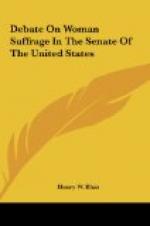who pay no taxes is not understood. The Saviour
said, seeing the poor widow cast her two mites,
which make a farthing, into the public treasury,
“This poor widow hath cast more in than all they
which have cast into the treasury.”
I see this among the poor working-girls of the
city of New York; sick, in a little garret bedroom,
perhaps, and although needing medical care and needing
food, they will say to me, “above all things
else, if I could only pay the rent.”
The rent of their little rooms goes into the coffers
of their landlords and pays taxes. The poor women
of the city of New York and everywhere are the
grandest upholders of this Government. I
believe they pay indirectly more taxes than the monopoly
kings of our country. It is for them that I want
the ballot.
REMARKS BY MRS. ELIZABETH BOYNTON HARBERT.
Miss ANTHONY. I now introduce to the committee Mrs. Elizabeth Boynton Harbert, of Illinois, and before Mrs. Harbert speaks I wish to say that for the last six years she has edited a department of the Chicago Inter-Ocean called the “Women’s Kingdom.”
Mrs. HARBERT. Mr. Chairman and honorable gentlemen of the committee, after the eloquent rhetoric to which you have listened I merely come in these five minutes with a plain statement of facts. Some friends have said, “Here is the same company of women that year after year besiege you with their petitions.” We are here to-day in a representative capacity. From the great State of Illinois I come, representing 200,000 men and women of that State who have recorded their written petitions for woman’s ballot, 90,000 of these being citizens under the law—male voters; those 90,000 having signed petitions for the right of women to vote on the temperance question; 90,000 women also signed those petitions; 50,000 men and women signed the petitions for the school vote, and nearly 60,000 more have signed petitions that the right of suffrage might be accorded to woman.
This growth of public sentiment has been occasioned by the needs of the children and the working-women of that great State. I come here to ask you to make a niche in the statesmanship and legislation of the nation for the domestic interests of the people. You recognize that the masculine thought is more often turned to the material and political interests of the nation. I claim that the mother thought, the woman element needed, is to supplement the concurrent statesmanship of American men on political and industrial affairs with the domestic legislation of the nation.
There are good men and women who believe that women should use their influence merely through their social sphere. I believe both of the great parties are represented by us. You remember that a few weeks ago when there came across the country the news of the decision of the Supreme Court as regards the negro race the politicians sprang to the platform, and our editors hastened to




